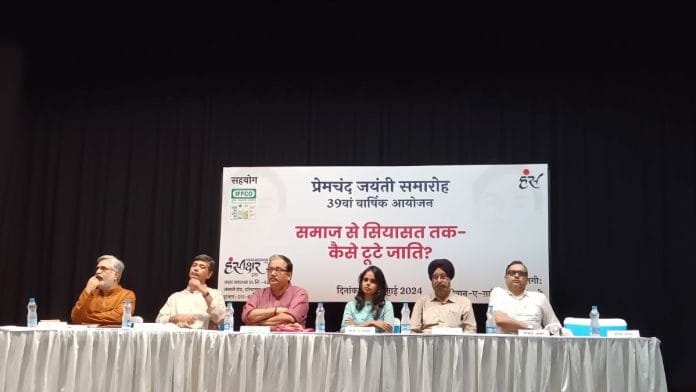New Delhi: Only in India does a panel discussion about how to break the caste system turn into one where every panellist concludes it can never be broken.
The title of the talk at Delhi’s Aiwan-e-Ghalib auditorium was Samaj se siyasat tak: Kaise toote jaati (From Society to Politics: how will caste break). The panel had well-known scholars, students, writers and politicians. The event was held to commemorate the birth anniversary of Hindi writer Munshi Premchand. But there was no mention of him throughout the discussion.
Social scientist and professor Badri Narayan, JNU professor Surendra Jodhka, Rajya Sabha MP Manoj Jha, Centre for the Study of Developing Societies (CSDS) professor Hilal Ahmed, poet Meena Kandasamy were panellists and the moderator was senior journalist Priyadarshan.
From Buddha to Bhakti movement to BR Ambedkar, from democracy to modernity – the antidotes to caste have failed to work.
The two-hour-long discussion, which started with how to dismantle the caste system, ended with a helpless admission: who even wants to break it? “Who wants caste to break? With reference to the title of P Sainath’s book, I want to say that like everyone loves a good drought, everyone wants caste,” said Narayan.
He said caste is a phoenix that never dies, asking that in a democracy, “where caste becomes the basis of the distribution of state resources, how will we get rid of it?”
He added that we have failed to answer this question again and again. “That is why it is said that Indian democracy has turned into a castocracy and modernity has turned into castonity,” Narayan said, adding that caste is not only an emotion but has a tendency toward instrumentality.
Also read: Film societies are dying in the OTT age. Nehru, Indira boosted their popularity
The idea of roti-beti relationship
Ram Manohar Lohia gave an idea of using the roti-beti relationship and distribution of economic resources to break the caste system. While Ambedkar believed that education would be key to break it, Kanshi Ram advocated for achieving power as a means to address the issue.
But Rajya Sabha MP Manoj Jha considers caste a “besuri chij” (tuneless thing) and cautioned that the political class should not be expected to tackle it.
“If one tries to tune a tuneless thing, it would be injustice. Our society has become regressive. This is a very difficult time. New paradigms of annihilation of caste will have to be created in this era,” he said.
Jha said if there is caste, then there will be caste-based mobilisation. “You cannot deny this,” he added.
Taking a jibe at Narayan’s ideological shifts, Jha said, “For some years, it seemed that Badri Bhai and I could not be on the same page. But the caste question brings us both onto the same page.” The entire auditorium burst into laughter.
“I do not see a single section of society which talks about breaking caste. Activists and academicians have always liked this question,” Jha said, adding that caste census is the need of the time.
Jha added if the Narendra Modi-led government completes its third term, it will conduct a caste census. He argued that once an idea has emerged, it can’t be set aside. Whoever tries to ignore it, will be sidelined from politics and society.
“Caste is a reality, and caste politics is also a reality,” Jha declared loudly, as if speaking in Parliament.
Hilal Ahmed, on the other hand, talked about caste as a sensitive issue and how it’s prevalent among Muslims. He said caste issues are presented in such a way as if it is an invention.
“Untouchability is also prevalent among Muslims, so the relationship of roti-beti is necessary to break it,” he said.
Feminist view of Caste
Among the mostly savarna panelists, there was one Dalit woman, the poet Meena Kandasamy. She chose to speak in English to a Hindi-speaking audience and addressed the feminist perspective on caste.
Kandasamy said the struggle against caste must also be a feminist struggle. “There is a general assumption that caste is a male problem and that its solution is found in the framework of masculinity,” she said.
She added that everybody is sovereign except Indian women.
(Edited by Ratan Priya)






